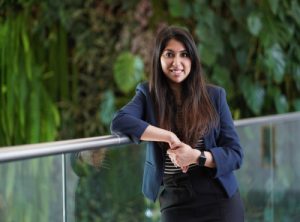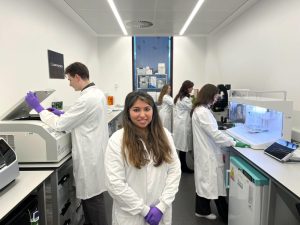
We spoke to Ishani Malhotra two years after Carcinotech completed the AI Accelerator to find out how her experience on the programme helped to shape Carcinotech's journey.

I started Carcinotech in 2018 based on my research at the University of Edinburgh, which involved using patient-derived cells to provide a platform for rapid and ethical drug testing. Carcinotech helps identify and test treatment options for patients diagnosed with cancer through ‘bioprinting’, which means using 3D printing technology to create a cell culture based on the patient’s own cells. We then use this to test combination therapies personalised to the patient.
Long preclinical drug discovery and clinical trial periods mean many of those diagnosed with cancer won't be able to experience innovative treatments that could potentially work for them within their lifetime. And every person's body and cancer makeup is different, so there needs to be more precision and personalisation for patients. Carcinotech’s models can streamline the drug testing process so clinicians know sooner if individual patients’ cancer cells will respond to certain treatments or not.
When we took part in the Accelerator, we were still developing our AI processes. Having learnt more about AI through the programme, we have since introduced AI technology into our imaging process to pick up certain imaging signatures. We are continuing to iterate on our AI processes and if this speeds up our analysis, then the turnaround time for testing and getting results to our customers will be much quicker. We have also ramped up our collection of patient data since taking part in the Accelerator, and are investigating how AI can enable us to start analysing common signatures and grouping patients based on that.
The AI Accelerator team introduced us to the Usher Institute, which was vital in helping us work collaboratively with clinicians to validate our technology. Since participating in the programme, we have expanded our portfolio into different cancer areas and evolved our business plan to cater to hospitals as well as pharma and Contract Research Organisations (CROs). We were looking to raise seed investment during the programme and there were a lot of pitching workshops that helped me learn the process and shape up our pitch deck. This paid off significantly as we were able to raise our seed round of £1.5 million just after finishing the Accelerator and have since gone on to raise another £4.2 million of investment. Our journey in the years following the AI Accelerator has been about building on the commercial insights we gained and the connections we made during the programme.
I found the support from the AI Accelerator to be very useful - as well as helping to shape our pitch and investment decks, there were also talks on marketing and recruitment that proved to be essential for us as we were expanding rapidly. The University support overall was very hands-on and tailored to exactly what we needed. The programme team were amazing and were always ready to help us make any necessary connections or contacts within the commercial, technological or medical spheres.
Our first measure of success is investment – we completed our seed round right after we finished the AI Accelerator programme and in the years since have raised essential investment to allow us to expand and enter new markets. Our next milestone is establishing a bigger presence in the US and growing our customer base. While we’re generating good revenue in the UK, the US is the biggest market for us and we’re excited to build on the traction we’ve already gained there.
I think people need to know to expect failure along the way before they start to see success. It’s good practice to learn from your mistakes and never be disheartened. Success takes time, so if you believe in what you're doing, don't give up and keep trying to learn from each failure.

Want to learn more about Carcinotech, click below to head to their website.